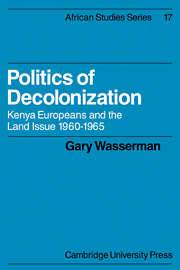Book contents
- Frontmatter
- Contents
- Dedication
- Acknowledgments
- Map
- Introduction: Kenya as a case study
- 1 Consensual decolonization: conditions, process, and the salient aspects of the Kenyan case
- 2 Background to decolonization: trends and groups in the European community
- 3 1960, initiating the bargain: the lobbying on the land issue and the dividing of the European community
- 4 1961, negotiating the bargain: accelerating the bargaining, deepening the divisions
- 5 1962, making the bargain: the resolution of the land issue and the dissolution of the European groups
- 6 1960–1970, sealing the bargain: the implementation of the Kenya land transfer schemes
- 7 Conclusion: Europeans, land and decolonization
- Notes
- Selected bibliography
- Index
4 - 1961, negotiating the bargain: accelerating the bargaining, deepening the divisions
Published online by Cambridge University Press: 04 August 2010
- Frontmatter
- Contents
- Dedication
- Acknowledgments
- Map
- Introduction: Kenya as a case study
- 1 Consensual decolonization: conditions, process, and the salient aspects of the Kenyan case
- 2 Background to decolonization: trends and groups in the European community
- 3 1960, initiating the bargain: the lobbying on the land issue and the dividing of the European community
- 4 1961, negotiating the bargain: accelerating the bargaining, deepening the divisions
- 5 1962, making the bargain: the resolution of the land issue and the dissolution of the European groups
- 6 1960–1970, sealing the bargain: the implementation of the Kenya land transfer schemes
- 7 Conclusion: Europeans, land and decolonization
- Notes
- Selected bibliography
- Index
Summary
Every white man in Nairobi is a politician; and most of them are leaders of parties.
Winston Churchill, My African JourneyWe have met the enemy and they is us.
Pogo (Walt Kelly's cartoon character)The differing political strategies of the conservatives and liberals (racial reentrenchment vs. class alignment) led to increasingly divergent political activities in 1961. The conservatives, stressing the preservation of the settlers' assets, found themselves channeled into lobbying on land rather than bargaining on broader political issues. The failure of most conservative candidates to win office in the spring elections further encouraged the narrowing of the farmers' efforts.
The liberals, while privately obstructing the farmers' lobbying, focused their attention on consolidating KADU moderates in government. The land issue was seen by the liberals both as an annoying diversion from their strategy of realigning the political structure and as a problem best solved by retaining their African allies in power. Consequently in the May 1961 discussions with the Colonial Office, New Kenya Group members argued for land transfers as a means of stabilizing the KADU government. Later, at the Governor's Conference, they accepted the lack of agreement on guaranteeing land titles as the price of keeping KANU out of government. Securing the settlers' assets remained a consequence of the liberals' political activities, not an immediate goal.
- Type
- Chapter
- Information
- Politics of DecolonizationKenya Europeans and the Land Issue 1960–1965, pp. 75 - 104Publisher: Cambridge University PressPrint publication year: 1976



